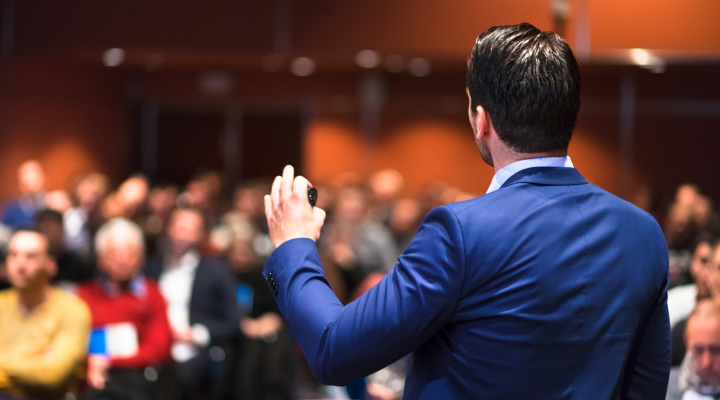The Importance of a Good Emcee
The importance of a good host, an emcee, is important for many reasons: they set the tone, keep your audience interested, help make the event an...
-Jul-22-2021-10-53-34-16-AM.png)
On Liveto’s webinar How to create buzz around your events Linda Nilsson had a very interesting discussion with Miguel Neves, who is EventMB’s Editor-in-Chief. It was a pleasure to have Neves in our webinar, because:
Nowadays we care about what other people are doing, for example, our family and co-workers. Social media can be used to contact and communicate with others and because of this, it is a very great tool to promote your event. Also, the lifetime of the event can be made longer with social media, using it before and some cases even after the event. During the event it is common for event organizers to encourage attendees to use certain hashtags or the partners to use social media to lure people to their booths at the event. Sometimes the participants can have their own discussion groups, like WhatsApp groups. Neves thinks that sometimes it is a good thing that participants can have their own chat groups where the event organizer is not present – this gives them a possibility to talk freely about the event.
Before the event the organizer can create a Facebook page for example where people can mark that they are going to attend this event. Then, there is a possibility to create chat groups which are meant for the people that are going to participate in this event. They don’t have to know each other or be friends to be able to join the same group (Facebook, WhatsApp, Slack or Telegram). This is a very good way to allow people to connect and network before the event. It is highly recommended that the event organizer would be active on social media before the event and create “behind the scenes material”. In Neves’ opinion that there is usually no point to extend the life of the event on social media afterwards.
Important questions to consider are: What people are looking for and in what time? What kind of event this is? When you first announce the event remember to tell the basic information: what the event is about, how much it costs and who can the participants meet there? After these, inform the agenda to the public. Third step is about social proof: who else is coming to the event? This journey can happen in two minutes or in months – depending on the event! Closer to the event date, the organizer must inform practical information to the participants: for example, where is the room in which the participant should go etc. Neves reminded that the important thing is to prepare the content and deliver it at a time that is the most proper for the people.
-Jul-22-2021-10-53-34-16-AM.png?width=720&name=BLOGIN%20KANSIKUVA_A%CC%88LA%CC%88%20POISTA%20(2)-Jul-22-2021-10-53-34-16-AM.png)
Community is when people are focusing on certain topic. Events can create a community or event can be a focal point for a community. For Neves buzz means that something is exiting. For example, trade show can have a buzz because people are talking with each other's, and they are interested in the same things. This can be harder to replicate online but it is possible, by example using chat.
Neves thinks that if the event organizer hires someone to help with the social media it is a short cut – it works but it doesn't create a community. Organizer should build a brand and not just use other people and their account to move the followers from their accounts: it is not long-lasting engagement. Social media helps to build a brand and every post is a part of it. It is also important to remember who are the people that you are trying to reach and what are the channels you can do it. Read more on how to update your business’s social media profiles here.
Not everyone is on social media, but every company has someone who is, and this way they can come across with your brand. This is why a common argument of “My clients don’t use social media” is not relevant. Neves thinks that LinkedIn is a great tool for professional use of social media. In the future in addition to that, TikTok has a lot of attention right now – maybe you can mix both? It is also important to think if the social media is public: can you control who can see your posts? For example, on Facebook you can share more private posts and control who can see those posts and on LinkedIn you can share public, professional information.
On the webinar Neves also got a great question from the chat about event industry and how volatile it is. This industry does not have guarantees for a specific career because all the companies work very differently. Neves thinks that it is possible to create a very interesting career in the event industry if you are flexible and interested in different aspects. For example, Neves has very versatile tasks, from video editing to writing books. You can watch the webinar from here.

The importance of a good host, an emcee, is important for many reasons: they set the tone, keep your audience interested, help make the event an...
-1.png)
Paptic and Liveto have been working together with multiple events. Paptic is an innovative company that makes sustainable alternatives for plastic in...
-1.png)
Fastroi is an innovative software company in the social- and healthcare industry. Fastroi has developed an industry leading care management system...